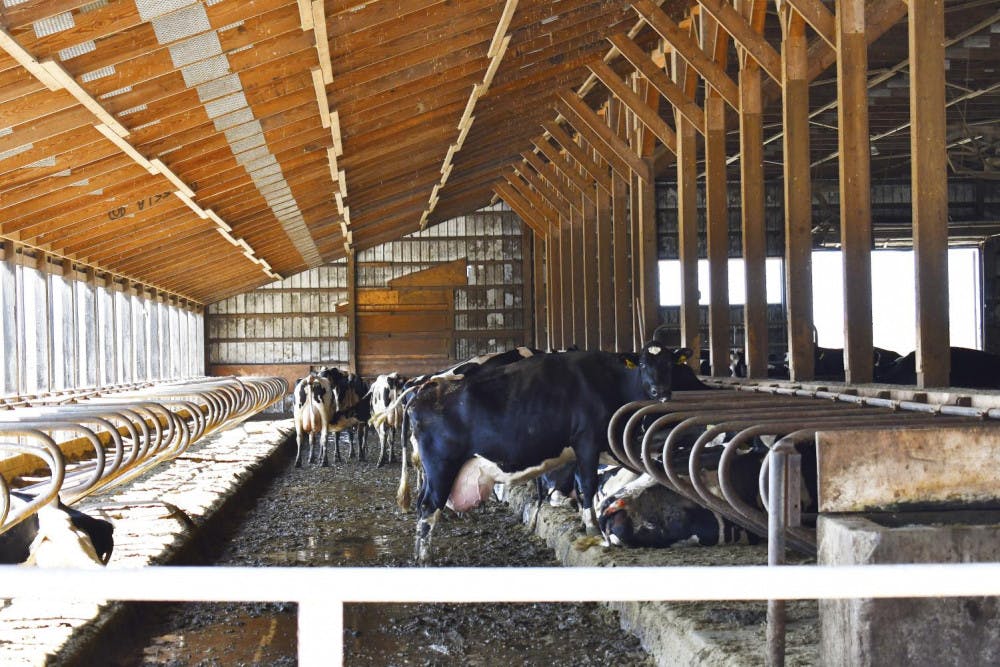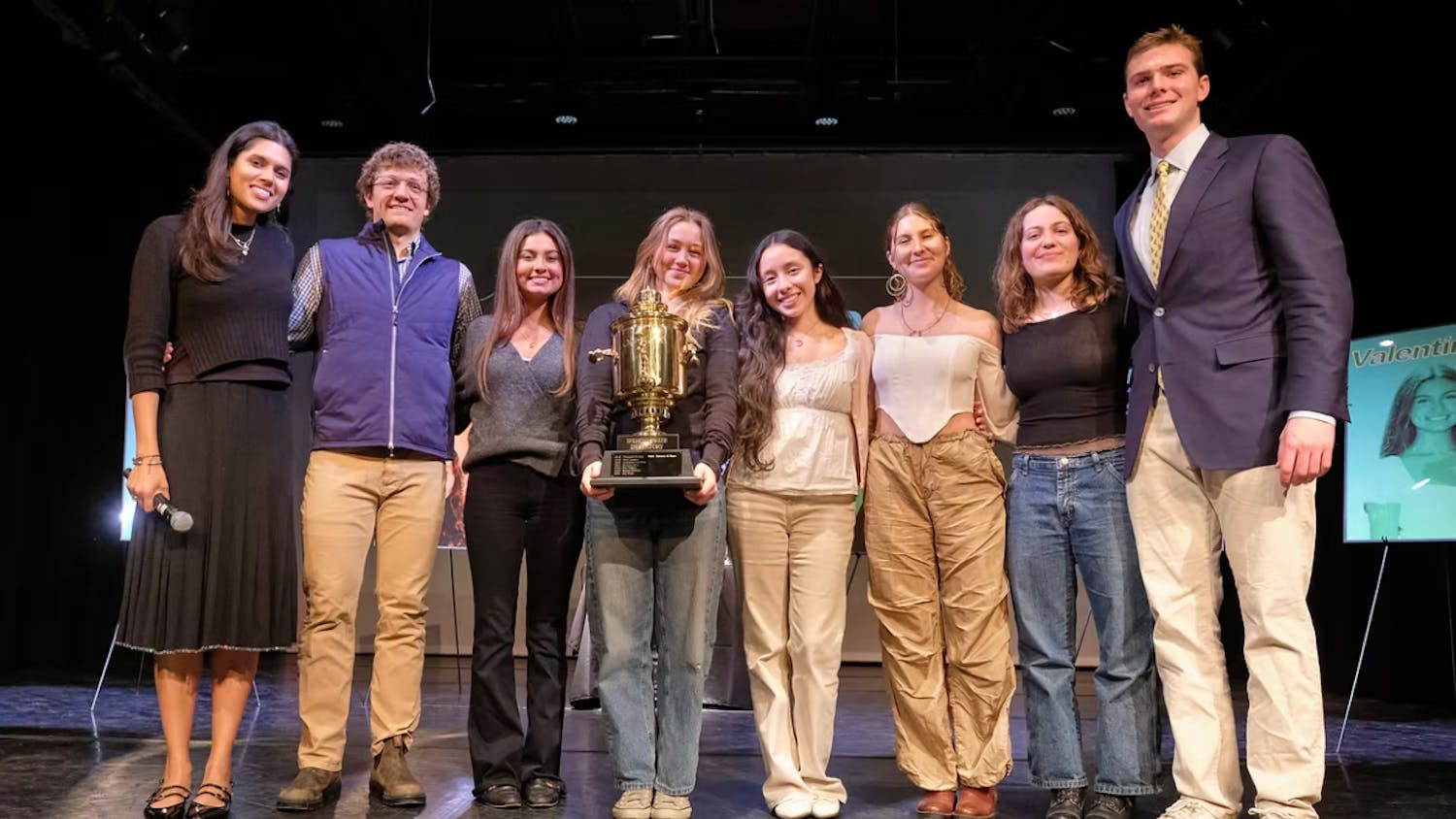Middlebury College broke ground on an anaerobic digester facility at the end of August, pushing the college towards its goal of using 100% renewable energy sources by 2028. The digester, the first of its kind in Vermont, will combine cow manure and food waste to convert the energy stored in organic materials present in the manure into Renewable Natural Gas (RNG).
During the event, spokespeople from the college, Vanguard Renewables, Goodrich Farm and the State of Vermont gathered at Goodrich Farm in Salisbury, Vt., to discuss the significance of the facility for the community and the college.
“This is a unique partnership between a Vermont college, local dairy farm, utility, and renewable energy company,” said John Hanselman, executive chairman and CEO of Vanguard Renewables. “The exciting result will be a sustainable source of energy that didn’t previously exist and the recycling of tons of organic waste that was once sent to landfills. The project will also enable food producers and users in Vermont to comply with Act 148, Vermont’s Universal Recycling law that bans all food waste from landfills and goes into effect in 2020.”
Vanguard, a renewable energy company based in Wellesley, Mass., will build, own and operate the digester. Vanguard currently owns and operates five other digesters located in Massachusetts, and its collaboration with Middlebury will be its first with a college.

Goodrich Farm, a fourth generation family dairy farm, is partnering with the college on this project, and will be the site of the digester.
“There isn’t another college in the country that’s in a partnership with a digester,” Hanselman said. “Middlebury is a true leader in this regard.”
The college will be the primary consumer of the RNG produced at the dairy farm. The energy from the digester is created by combining locally sourced food waste with the cow manure. This allows for a process of anaerobic digestion to take place and produce renewable gas that will be used to supply approximately 50% of the energy the college uses for heating and cooling. The other 50 % will be supplied by the college’s biomass plant.
Gabe Desmond, ’20.5, a student organizer and summer Sustainability Solutions Lab intern, toured the project site at Goodrich Farm.
“Although we meet the majority of our heating needs from gasifying woodchips in our biomass plant, during peak consumption, we still rely on fossil fuels, namely fracked natural gas,” he said. “Fracked gas is not only bad in terms of climate change, but it is also detrimental to the communities who live near fracking sites. Transitioning to RNG that comes from manure and food waste will allow us to stop relying on fracking, while also repurposing food waste and manure.”
Vermont Gas, another shareholder in the Goodrich Farm digester, is spearheading the construction process of the five-mile pipeline that will connect the farm with the company’s pipeline network in Addison County. Once completed, the natural gas produced at the farm will travel via the pipeline to Middlebury College’s main power plant.
Beth Parent, the communications and brand manager of Vermont Gas Systems, said that her company is the first local distribution company in the country to offer customers a renewable natural gas service.
“With the Vanguard project, VGS is proud to have a local source of RNG, with all of the benefits it brings to this community and our state,” she said. “This is another big win for Vermont — a big step forward in helping achieve Vermont’s clean energy goals, and we at VGS are proud to do our part.”
The digester is expected to produce 180,000 Mcf per year, with each Mcf containing 1,000 cubic feet of renewable natural gas. The college will buy 100,000 Mcfs from Vanguard, Vermont Gas will buy 40,000 Mcf and Vanguard will retain 40,000 Mcf.
While the partnership between Middlebury College, Vanguard Renewables, Vermont Gas and Goodrich Farm was announced in 2017, the Goodrich family and the college first engaged in talks of such a project over a decade ago, and have been working on it in various forms ever since.
“Our family is excited to see this project transition from a dream into a reality,” said Chase Goodrich, who is among the fourth generation of his family to operate the farm.
The farm will reap the benefits of the digester, both environmentally and financially; free heat for farm use and an annual lease payment for hosting the digester will diversify the farm’s revenue sources.

Goodrich Farm houses 900 milking cows at their location, 5.6 miles from campus. The new digester will help reduce greenhouse gas emissions from the cows and provide energy to the college.
According to Vermont Secretary of Agriculture Anson Tebbetts, the environmental benefits of the digester all have serious potential to transform the dairy industry, one of the main contributors to climate change. These benefits include the production of quality liquid fertilizer that will reduce reliance on chemical fertilizers, as well as a reduction in the farm’s phosphorus levels and greenhouse gas emissions.
At the digester’s launch, Tebbetts credited the Goodrich family for their leadership.
“We hope a project like this spark more innovative partnerships that include other Vermont farms,” Tebbetts said.
President Laurie Patton voiced a similar sentiment, confident that the facility will “provide our students and faculty with new research and teaching opportunities” and will serve as a fundamental component in the college’s Energy 2028 plan.
The 2028 initiative also includes a 25% reduction in overall energy use and a complete divestment of Middlebury’s endowment in fossil fuels.
Construction of the anaerobic digester is slated to be completed by 2020.
Energy 2028 update: College partners with Goodrich Farm on anaerobic digester project

MAX PADILLA
Cows at Goodrich Farm in Salisbury, Vt., will provide 100 tons of manure daily for the anaerobic digester.
Cows at Goodrich Farm in Salisbury, Vt., will provide 100 tons of manure daily for the anaerobic digester.
MAX PADILLA
MAX PADILLA
Comments



